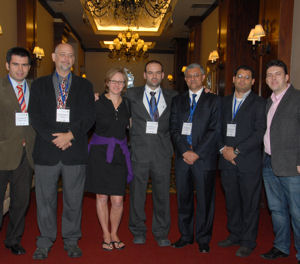Hospital medicine in Chile
The international hospitalist movement continues to grow, especially in South America.
The international hospitalist movement continues to grow, especially in South America. An example is Chile. In 2008, Chile's first meeting of hospitalists had two speakers: Greg Maynard, ACP Member, from the University of California, San Diego, and Efren Manjarrez, ACP Member, from the University of Miami. At the second meeting this past July in Santiago, there were five U.S. speakers from the Mayo Clinic in Rochester, Minn., and Emory University in Atlanta, and one lecturer from Brazil. Topics ranged from medical management of hospitalized patients to administrative issues like dashboards and metrics. More than 160 people attended, many of them house staff and students from around the country.
Though hospital medicine is growing slowly in Chile, it has a foothold. There is one hospitalist group in Santiago, with seven active members, at the Hospital Cl’nico de la Pontificia Universidad Cat—lica de Chile. The first hospitalists there, Andrés Aizman, ACP Member, and Gonzalo Eymin, MD, blazed the trail in 2004, and were soon joined by Luis Rojas, ACP Member.

The group does about 80% of its work in conjunction with resident services; the rest of the time the physicians manage private inpatients. Their duties include teaching fourth-year medical students and conducting medical research and administration; they work weekdays with a weekend call schedule. Residents regularly rotate onto the hospitalist service from other institutions, a good sign of the growing interest in hospital medicine.
Before this hospitalist group existed, hospital services were covered by specialists who rotated only a few weeks a year, making process improvement and practice development a relative impossibility. With the hospitalist group in place, however, the hospital has made progress on standardization of medical management in areas like DVT prophylaxis and urinary catheter removal reminders. The quality of inpatient education is improving, too: currently, the group is working on a trial (SUGAR-MINT) to examine inpatient diabetes management.
In general, hospitals and physicians in Chile are committed to improving safety. Many facilities are certified by the Joint Commission and therefore have a strong incentive to maintain high standards of quality and safety.
But the Chilean hospitalist movement faces several barriers. The first is the payment system. Because of their low salaries, physicians are loathe to give up their hospital practices; they often round early in the day, then head off to office practices. There is no financial incentive for them to support hospitalists. Another issue is that the payment structure is fee-for-service, with no cost limit, so there isn't a financial incentive to limit length of stay or preserve resources.
The biggest barrier, however, may be lack of knowledge about what hospitalists are, and what they do. The U.S. is at a point where most of our physician colleagues, and many of our patients, are familiar with the concept of hospital medicine. Chile is a decade behind in this regard, and with ignorance often comes suspicion.
For these reasons, the hospitalists at Hospital Cl’nico de la Pontificia Universidad Cat—lica de Chile feel their greatest achievement to date is the fact that they exist. Starting a new group in a new field is a difficult undertaking. But now that the flag has been planted, the group will certainly flourish in the years to come.



